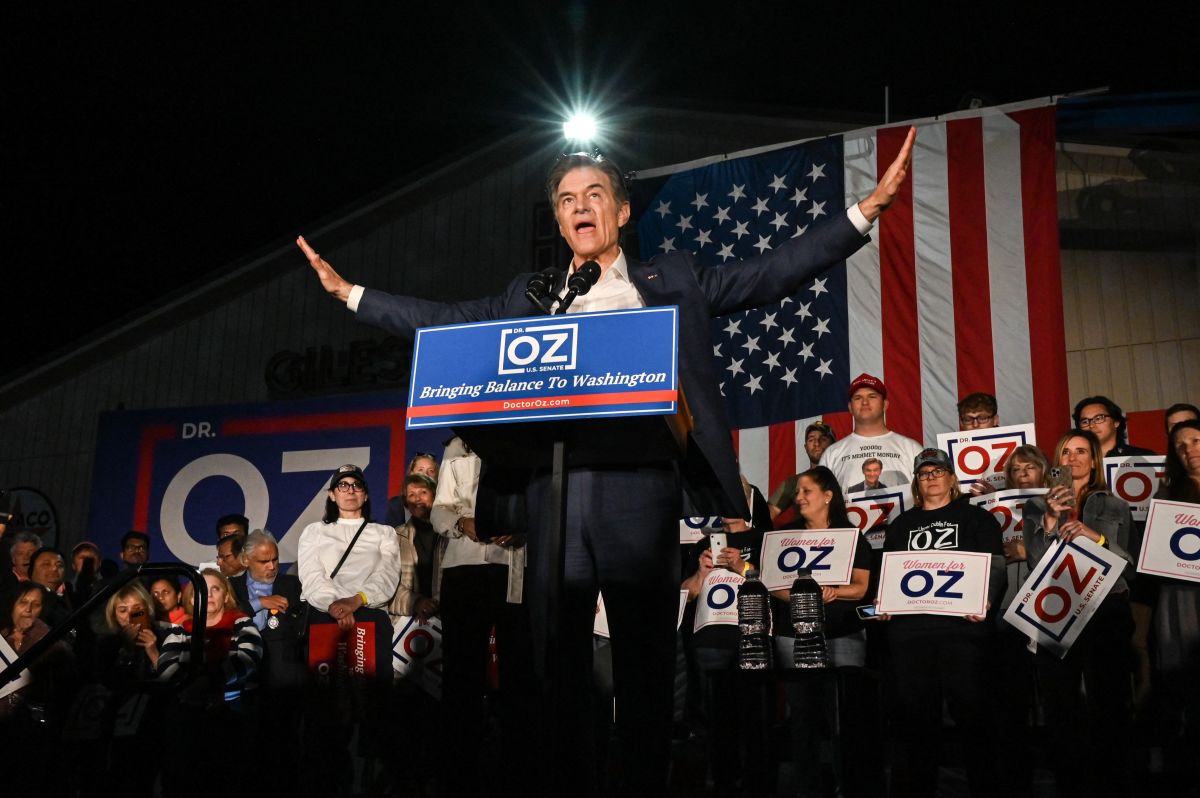
Dr. Mehmet Oz, a world-renowned cardiothoracic surgeon and controversial television personality, has been tapped by former/future president Donald Trump to become the next administrator of the Centers for Medicare and Medicaid Services, a federal agency within the Department of Health and Human Services.
This move startled many, as Oz isn't just a heart surgeon — he's also a wealthy and influential former television personality whose history of hawking questionable health products and dispensing dubious advice to his massive audience has left his peers in the medical field wondering if he had purposefully hurdled his Hippocratic oath for personal gain.
A spokesperson for nonprofit watchdog group Public Citizen called Oz's nomination for the public health position "totally egregious," citing his "deep ties to the private healthcare industry."
Oz’s nomination is one of several potential appointments of television personalities to political postings by President Trump, himself a former reality TV show host.
This potential post won’t be Oz’s first foray into politics, however. After moving to back to Pennsylvania from New Jersey in 2020, he ran in the state’s 2022 senate race on a Trump-endorsed, conservative, “America first” platform but lost to democrat John Fetterman.
Don't miss the move: SIGN UP for TheStreet's FREE daily newsletter
Dr. Oz first rose to household fame via repeated successful guest appearances on Oprah Winfrey’s talk show during the mid-aughts. This notoriety helped him land a daily talk show of his own in 2009. On it, Oz hosted countless guests and dispensed information and advice (much of which has been criticized as irresponsible or lacking sufficient evidence) about the many facets of human health and nutrition.
His show, which won 10 Emmys, ran for 13 seasons until 2022, when he chose to end the project to focus on his Pennsylvania Senate bid.
As the pop doctor’s notoriety has grown over the years, so has his wealth. But how much is he worth now that he’s stepped out of the television spotlight and into Trump’s potential second-term team? How did he make his money? And why is he so controversial in both media and medicine?

What is Dr. Oz’s net worth ahead of 2025?
While Dr. Oz’s exact current net worth isn’t publicly known, he was required to disclose a list of his assets (things like stock holdings and real estate) and liabilities (debts) as a part of his bid for a senate seat in 2022. Based on the numbers listed in this disclosure document, his net worth was somewhere between $100 million and $315 million at the time.
Among the assets listed in his financial disclosures, Oz held between $500k and $1 million in cash in a J.P. Morgan checking account, multiple residential properties worth between $1 million and $5 million each, and massive stock holdings in companies like convenience store chain Wawa, his wife’s family’s tree-trimming company Asplundh, and major tech companies like Amazon, Google, Microsoft, and Nvidia.
He also listed a cattle farm worth $5 million and livestock valued at between $250k and $500k. Since only several years have passed since this disclosure, Oz likely retains many of these assets.
Related: Peter Thiel’s net worth: How the controversial Palantir founder made his money
During his attempt at the senate, Oz reportedly spent over $27 million of his own wealth to fund his campaign (the most spent by any senate candidate that year), which would have taken a significant bite out of his net worth. Since he ended his show while campaigning, his income likely decreased in the subsequent years as well.
Nevertheless, Celebritynetworth.com, a popular website that provides net worth estimates for celebrities and other public figures (but does not disclose its methodology or cite sources), still pegs Oz’s current net worth at $300 million.

How did Dr. Oz make his money? His income streams explained
While Oz began his career as a heart and chest surgeon — a career that now pays an average of over $800k annually, according to the Society of Thoracic Surgeons — he has also earned income through various other sources, including speaking appearances, magazine features, multiple TV shows, a television production company, a radio program, and a number of best-selling books.
While his annual earnings certainly vary, his 2022 financial disclosure revealed that in 2021, he made over $9.3 million before tax, which would put him in the 99th percentile of earners in the United States.
That year, Oz earned nearly $600k for speeches and event appearances and also took in over $330k in patent royalties from Columbia University. His stock holdings in Asplundh and Wawa paid him between $1 million and $5 million each in dividend income.
Oz also took home a salary of $2 million as the host of his eponymous daytime television show and banked an additional $194k as the show’s supervising producer. While impressive, these amounts pale in comparison to the over $7 million he made via his ownership stake in Oz Media, his production company.
Oz ended his daytime television show in early 2022, so his annual income has likely decreased to some degree in the subsequent years.
Why is Dr. Oz so controversial? From surgeon to snake oil salesman
When he first started appearing on Oprah’s talk show, Oz was a highly respected physician, and his soundbites were usually characterized by reasonable health and nutrition advice delivered with kindness and humor. As his airtime increased, however, Oz’s content began to veer into more ethically questionable territory, especially given his credentials as a medical professional.
The bulk of the criticisms that have been leveled at Dr. Oz over the years stem from pieces of dubious and even downright dangerous health advice he’s shared on “The Dr. Oz Show.” He’s also drawn ire for promoting products from companies he has financial ties to.
And while plenty of public figures share questionable advice every day, Oz’s trusted scientific status as “America’s Doctor” and the fact that his questionable advice has always been of a medical nature puts him in a different category altogether.
Related: Pamela Anderson’s net worth: The millions she should have made
COVID-19 missteps
During the deadly and highly politicized COVID-19 pandemic, Oz joined Donald Trump in repeatedly promoting the use of hydroxychloroquine, an antimalarial drug, to prevent and treat serious COVID-19 infections — despite a lack of clearly demonstrated efficacy and warnings from the FDA that the drug could cause heart problems.
A study by the Department of Veterans Affairs published in 2020 found that COVID-19 patients treated with the drug were more likely to die than those who weren’t, underscoring the danger of trusted public medical figures like Oz advocating for untested and potentially unsafe solutions to widespread health problems.
When Oz’s assets became public record via his 2022 financial disclosure, it was revealed that he held stock in at least two pharmaceutical companies that supply or distribute hydroxychloroquine, although it’s unclear whether he purchased these shares before he began promoting the drug on Fox News.
Early on in the pandemic, Oz also drew criticism for advocating the reopening of schools, saying “I just saw a nice piece in The Lancet arguing that the opening of schools may only cost us 2 to 3 percent in terms of total mortality.” After widespread backlash, Oz said he “misspoke.”
Misleading medical advice & miracle cures
Oz’s track record of sharing medical misinformation didn’t begin during the pandemic, though — his 13 seasons of daytime television provided him ample airtime to publicly fumble his Hippocratic duties.
Over the course of his show, Oz at various times promoted unregulated relaxation drinks with unknown amounts of potentially dubious ingredients, pseudoscientific practices like iridology (diagnosing health conditions by looking at an individual’s iris), and a variety of “miracle” weight loss pills and cures.
Product pushing and business ties
Oz’s show also served as a sort of guerrilla marketing platform for various companies he had business ties with. One such partnership was with Usana Health Sciences, a multi-level-marketing company whose collagen products Oz regularly featured on his program.
Oz also became a board member of a company called Pantheryx, a role for which he would receive 700,000 shares of stock in exchange for three years of service. Without disclosing this relationship to viewers, he promoted unregulated colostrum supplements made by TruBiotics, a Pantheryx-owned brand.
Criticism from the Senate
Oz’s propensity for sharing misleading advice and pitching products on his show eventually drew the ire of the U.S. Senate, who called on the doctor to testify before the Subcommittee on Consumer Protection, Product Safety and Insurance.
In speaking to Oz at the hearing, Senator Claire McCaskill summed up Oz’s process and its consequences: “When you feature a product on your show, it creates what has become known as the ‘Dr. Oz Effect’ — dramatically boosting sales and driving scam artists to pop up overnight using false and deceptive ads to sell questionable products.”
Criticism from the medical field
Dr. Oz’s transition from real surgeon to product-pushing TV doctor was also noticed by those in his own field.
In 2014, an article published in the British Medical Journal determined that 39% of 80 claims made by Oz on his show weren't supported by available scientific evidence and 15% were directly contradicted by known medical evidence, for a total of 54% of the examined claims lacking evidentiary backing.
In 2015, a group of 10 concerned doctors from around the country cosigned an open letter to Columbia University, which employed Oz on its medical faculty until 2022, asking the institution to sever its ties with the increasingly disgraced physician.
The letter (available in full on Vox) described Oz as demonstrating “an egregious lack of integrity by promoting quack treatments and cures in the interest of personal financial gain” and accusing him of “either outrageous conflicts of interest or flawed judgments about what constitutes appropriate medical treatments, or both.”
Daniel Summers, a Massachusetts doctor, shared his opinion of Oz as it related to the Doctor’s 2022 pivot to politics, saying “Throughout his career in the public eye, Oz has shown a distressing willingness to say or do things he knows aren’t backed by medical science in service to his own fam” to the Daily Beast.
In 2017, three doctors published an article in the American Medical Association’s Journal of Ethics concerned almost entirely with Oz’s outsized impact on the profession of medicine and the dangers similar actors could pose in the future. The article’s abstract asserts that Oz is “visibly out of step with his profession” and goes on to describe him as a “a dangerous rogue unfit for the office of America’s doctor.”
More net worth:
- Jerry Jones’s net worth: How the Cowboys owner made his money
- Bruno Mars' net worth: The pop icon's wealth going into 2025
- Michael Dell’s net worth & salary as Dell CEO
Dr. Oz's relationship with Donald Trump & potential Medicare appointment
While Oz’s days of televised quackery are, at least for the time being, on pause, his potential new role as Trump’s appointee to direct the Centers for Medicare and Medicaid Services could raise new concerns.
The appointment isn’t necessarily unexpected, though — Oz’s relationship with President-Elect Donald Trump dates back to well before the two joined forces in promoting hydroxychloroquine as a COVID cure.
In 2016, Oz had Trump on his show, where he reviewed the then-candidate’s supposed medical records after Trump had previously been criticized for refusing to make them public. After reviewing the paperwork, Oz stated, “If a patient of mine had these records, I’d be very happy, and I’d send them on their way.”
Later, in 2018, Trump appointed Oz to his council on sport, fitness and nutrition, alongside actor and bodybuilder Lou Ferrigno and New England Patriots coach Bill Belichick. Biden removed Oz from this council in 2022.
In 2022, Trump endorsed Oz's expensive and unsuccessful senate bid, during which the doctor campaigned on a conservative, America-first platform that echoed many of Trump's own talking points.
Now that he’s been nominated to run Medicare and Medicaid, two massive government health programs, critics are concerned about potential conflicts of interest, including the doctor’s possible financial ties to drug companies like Novo Nordisk through a company he co-founded called Sharecare.
Novo Nordisk produces Ozempic, which Oz has long been a vocal proponent of and whose long-term effects are still in question. If appointed to the administrator role, Oz could potentially push for medications like Ozempic to be covered under insurance plans provided by Medicare or Medicaid.
As of 2022, Oz also owned stock in multiple insurance providers that contract with and earn money from Medicare. It is unclear whether Oz will be required to once again publicize his assets or sell off any holdings that could create conflicts of interest regarding his possible role as Medicare and Medicaid administrator.
Related: The 10 best investing books (according to stock market pros)







